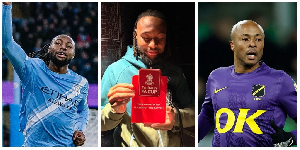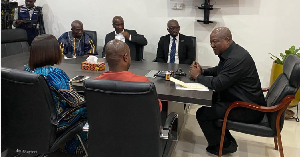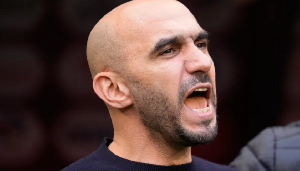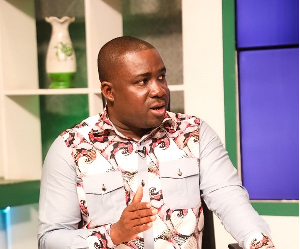By Dr. Michael J.K. Bokor
E-mail: mjbokor@yahoo.com
December 14, 2009
The “human elephants” constituting the NPP are at each other’s throat, slashing it left and right with their tusks, while their feet are doing overtime to keep their huge elephantine hulk upright. It is a sight for sore eyes. Don’t be surprised. There is nothing more dangerous than an emotionally disturbed elephant.
This acrimony is just one of the intriguing happenings in our 4th Republic that continue to expose the loopholes in our democratic experiment. Particularly, the internal bickering and rabble-rousing within the ranks of both the NDC and the NPP are too obvious to be neglected in our public discourse. I am piqued by these events, especially the current stirrings in the NPP that have been aroused by Dr. Kobina Arthur Kennedy’s efforts to push his party’s functionaries toward introspection (self-examination) on why the NPP lost the 2008 elections. His effort is not the first attempt to adduce reasons for the party’s defeat; but it is the first of its kind in terms of the perspective from which he is suggesting the introspection to be done. That is where he disrupts the Indian file of the political soldier-ants (or elephants?).
Jolted out of their complacency and disillusioned by their electoral defeat, some of the NPP’s functionaries quickly gave reasons for their being rejected by the electorate. Some attributed it to the ingratitude of Ghanaians (for not recognizing the development projects that Kufuor built for them); biased voting in the Volta Region; too much complacency and failure to overdo the NDC’s propaganda machinery; massive loss of votes due to electoral maladjustments; and many more. These reasons were mostly based on external factors that presented the NPP as a victim of unfortunate electoral circumstances. This construct doesn’t wash with some of us. Other reasons account for the fate of the party.
Now, another twist to the matter has emerged: “The former Presidential aspirant of the New Patriotic Party, Felix Owusu Agyapong, has blamed too much drumming and dancing in the heat of the 2008 campaign for the party’s defeat…. Instead of spending more time on constituency, polling area campaign, we spent more time on regional, national campaign and … we spent a bit more time in entertainment rather than addressing people,” he told Joy News in an interview on Friday.
According to Mr. Agyapong, the campaign strategy dedicated “more activities to playing music” instead of the actual dissemination of information. This viewpoint brings into sharp focus the kind of sober introspection that one should be doing. That’s undeniable and is exactly what Arthur Kennedy is drawing attention to, even if he has chosen the unexpected medium of a book. He appears to have made an effort to shift the paradigm as he looks inwards for reasons to explain what went wrong for the NPP and to determine what the party can do to avert a similar disaster in future.
His book (Chasing the Elephant into the Bush: The Politics of Complacency) has rather touched raw nerves and evoked anger and coarse insults from his own party’s members. He is being verbally attacked as if he has killed the goose that lays the NPP’s golden political eggs. The attitude toward him confirms my suspicion that Ghanaian politicians are intolerant, impatient, and unforgiving. They like to hear only what will inflate their egos and please them. Anything short of that is disastrous and must be zapped. That has been the trend in our politics.
No doubt, our politicians lack the capacity for self-examination. When the NPP’s Adu Boahen lost the 1992 Presidential bid, the party boycotted the Parliamentary aspect of the elections as its intellectuals chose to look for reasons outside their own inadequacies. They wrote The Stolen Verdict as their response to what they called “rigging” and have since used that document as the party’s blueprint for assessing its relationship with the NDC, in particular, and the Ghanaian electorate, generally. The contents of that book do not focus on the party’s own internal lapses and cannot be said to be beneficial for any in-depth analysis of the factors that contributed to the NPP’s poor showing in the elections.
When the NDC lost the 2004 elections, its leaders (especially Jerry Rawlings) insisted that the elections were rigged, and blamed the NPP and the Electoral Commission for their woes. But for the resolute determination of some high-ranking members of the NDC, Rawlings’ attempts for demonstrations to be held against the Electoral Commission and the NPP would have plunged the country into chaos. Accusing the winning party of rigging elections hasn’t helped much. It is, therefore, heart-warming for someone in the shoes of Arthur Kennedy (Communications Director of the NPP’s 2008 Campaign Team) to turn the searchlight inwards to identify the party’s own foibles and frailties that prevented it from retaining power. What he has done so far is commendable as a bold attempt to shift emphasis from victimology to something more related to the internal weaknesses of the party. His work should not be regarded as nettlesome but appreciated as an eye-opener. There is nothing wrong with self-examination. The problem, however, is that the kind of self-examination he suggests is “novel” to the NPP, I suppose; hence, the attempt to throw it (the bath water) away with him (the baby). Instead of treating him like someone who has killed the NPP’s sacred cow, the party’s followers should fall in step and do exactly what he has suggested. But behaving like the animalistic elephant that adorns their party’s emblem, the NPP’s followers are castigating him here and there in the characteristic manner of people full of their own self-importance. True to its nature, the elephant is the only animal which, once offended, never forgives nor forgets until it is at last killed by an ant! The political ants are already gearing up for 2012. Arthur Kennedy’s bold efforts to bring home to the NPP the reasons for its rejection at the 2008 polls shouldn’t have been met with this kind of fierce resistance, name-calling, and outright condemnation by those NPP elements who have so far reacted to his book. Poor Arthur Kennedy. He is now being pushed to the wall instead of being supported for taking a critical peek into the NPP and its relationship with the electorate. His post mortem has revealed serious issues that not only reveal the fault lines within the fabric of the NPP but have also blown apart the false sense of confidence and conviction that the NPP was formidable and indefatigable.
I knew all along that any effort to tell the NPP the truth would be met with this kind of stiff opposition. This is a party made up of so-called intellectuals, each of whom thinks that he is better than everybody else in sight. They haven’t hesitated to tell the whole world that they are the only people with the acumen to solve Ghana’s problems. They haven’t ceased annoying the whole world with their so-called academic credentials and boasts of being successful businessmen. But they have forgotten that success in academia and business doesn’t necessarily translate into success in politics. Given the chance, they took it but messed with it. Now, their backside is being exposed from within and they are up in arms against one of their own. I have always suspected that course of action; but what do I care about a political party that hasn’t endeared itself to me, anyway?
I haven’t yet read Kennedy’s book but snippets from it and the responses from within the NPP so far have convinced me that he has hit hard on the underbelly of the NPP and exposed its most sacred truths. Otherwise, why should he become the target of all kinds of venom from those who have reacted so far, some of whom (including Kwaku Baako and Egbert Faibille) should rather have kept quiet? Kwaku Baako and Egbert Faibille claim to be journalists and should have known that every pen pusher worth his calling would prefer to remain at the touchline and not dive into the stream of partisan politics to swim on the side of one party. Kwaku Baako was the first to overshoot his mouth, drawing a vitriolic response from Arthur Kennedy, which left no one in doubt that he is a mere mischief maker. Now, Egbert Faibille is accusing Arthur Kennedy of indulging in “student politics,” whatever that means to him.
It is prudent for the NPP to examine all viewpoints concerning its failure to retain power at the polls and to make amends. After all, the party’s leadership have to know that the Ghanaian electorate were not impressed by all the NPP’s showings and insistence on being seen as the best that Ghana could have. It is not. Judging from the sentiments of the electorate and the wanton manner in which Kufuor administered affairs, it was very clear that the NPP’s fortunes were going to dip at the 2008 polls.
Just a few instances. When public anger against Kufuor’s senseless foreign trips were mounting, the NPP elements rose to his defence, making it clear to the electorate that all that they were complaining about was untenable. As the wearers of the shoe, the people knew where it pinched them and their complaints should have been listened to and reasonable amends made. But like a run-away horse that could no more be reined in, Kufuor worsened matters as he undertook more trips and brought in nothing to positively change living conditions for the people. In the end, he told Ghanaians that they couldn’t make it because they were too lazy to take advantage of his government’s good policies. Again, Kufuor’s turning a blind eye to the spate of corruption in his government—insisting that corruption had been with humanity since the days of Adam—inflamed passions against the NPP. Let no one have any doubt about that fact.
Then again, at a time that the people were griping over their worsening living conditions, Kufuor chose to waste the country’s resources on buying expensive gold medals to award himself and the bootlickers that his party identified. The unconscionable expenditure on the Ghana@50 celebrations and the Taj Mahal of a so-called Presidential Palace (Jubilee House) were other issues that angered the electorate. Other factors such as nepotism in officialdom, laxity in moral conduct by Kufuor’s appointees, and the flaunting of ill-gotten wealth were responsible for the dwindling away of the NPP’s fortunes.
Let it not be minced that the Kufuor government appeared not to know the depth of public resentment against the tribal politics that it was practising. The voting trend itself confirmed that apprehension, given the fact that the NPP made gains principally in the Ashanti and Eastern Regions while losing grounds in others that it had all along taken away from the NDC. In this sense, then, no one should try to hide behind any veneer of loyalty to the NPP to deceive anybody about the actual reasons for the party’s rejection.
The tired saying that when two elephants fight, it is the grass that suffers is being articulated in several ways, only this time, the elephants are fighting in hot sand, not grass; and they, not the hot sand, are suffering the scalding. When the fighting simmers down after all, the reality will emerge to absolve Arthur Kennedy. I rest my case.
Opinions of Wednesday, 16 December 2009
Columnist: Bokor, Michael J. K.














